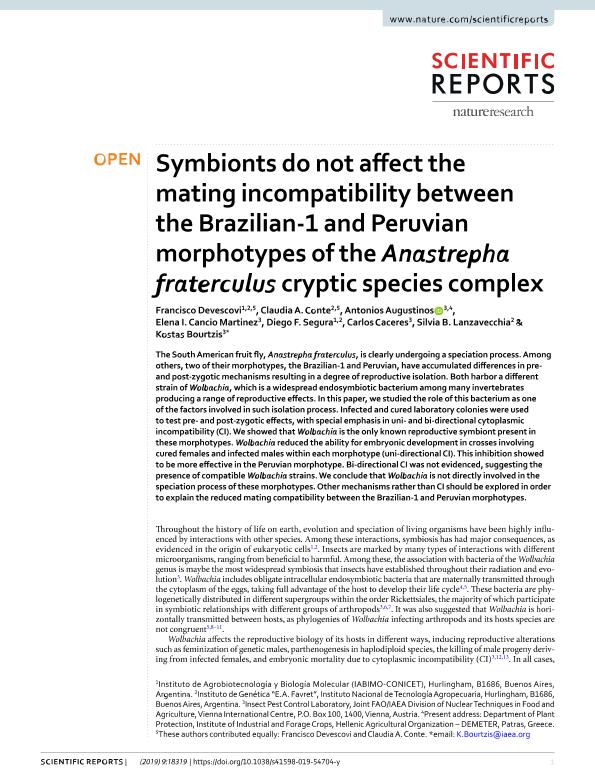Artículo
Symbionts do not affect the mating incompatibility between the Brazilian-1 and Peruvian morphotypes of the Anastrepha fraterculus cryptic species complex
Devescovi, Francisco ; Conte, Claudia Alejandra
; Conte, Claudia Alejandra ; Augustinos, Antionios; Cancio Martinez, Elena; Segura, Diego Fernando
; Augustinos, Antionios; Cancio Martinez, Elena; Segura, Diego Fernando ; Caceres, Carlos; Lanzavecchia, Silvia Beatriz
; Caceres, Carlos; Lanzavecchia, Silvia Beatriz ; Bourtzis, Kostas
; Bourtzis, Kostas
 ; Conte, Claudia Alejandra
; Conte, Claudia Alejandra ; Augustinos, Antionios; Cancio Martinez, Elena; Segura, Diego Fernando
; Augustinos, Antionios; Cancio Martinez, Elena; Segura, Diego Fernando ; Caceres, Carlos; Lanzavecchia, Silvia Beatriz
; Caceres, Carlos; Lanzavecchia, Silvia Beatriz ; Bourtzis, Kostas
; Bourtzis, Kostas
Fecha de publicación:
12/2019
Editorial:
Nature Publishing Group
Revista:
Scientific Reports
e-ISSN:
2045-2322
Idioma:
Inglés
Tipo de recurso:
Artículo publicado
Clasificación temática:
Resumen
The South American fruit fly, Anastrepha fraterculus, is clearly undergoing a speciation process. Among others, two of their morphotypes, the Brazilian-1 and Peruvian, have accumulated differences in pre- and post-zygotic mechanisms resulting in a degree of reproductive isolation. Both harbor a different strain of Wolbachia, which is a widespread endosymbiotic bacterium among many invertebrates producing a range of reproductive effects. In this paper, we studied the role of this bacterium as one of the factors involved in such isolation process. Infected and cured laboratory colonies were used to test pre- and post-zygotic effects, with special emphasis in uni- and bi-directional cytoplasmic incompatibility (CI). We showed that Wolbachia is the only known reproductive symbiont present in these morphotypes. Wolbachia reduced the ability for embryonic development in crosses involving cured females and infected males within each morphotype (uni-directional CI). This inhibition showed to be more effective in the Peruvian morphotype. Bi-directional CI was not evidenced, suggesting the presence of compatible Wolbachia strains. We conclude that Wolbachia is not directly involved in the speciation process of these morphotypes. Other mechanisms rather than CI should be explored in order to explain the reduced mating compatibility between the Brazilian-1 and Peruvian morphotypes.
Archivos asociados
Licencia
Identificadores
Colecciones
Articulos (IABIMO)
Articulos de INSTITUTO DE AGROBIOTECNOLOGIA Y BIOLOGIA MOLECULAR
Articulos de INSTITUTO DE AGROBIOTECNOLOGIA Y BIOLOGIA MOLECULAR
Citación
Devescovi, Francisco; Conte, Claudia Alejandra; Augustinos, Antionios; Cancio Martinez, Elena; Segura, Diego Fernando; et al.; Symbionts do not affect the mating incompatibility between the Brazilian-1 and Peruvian morphotypes of the Anastrepha fraterculus cryptic species complex; Nature Publishing Group; Scientific Reports; 9; 1; 12-2019
Compartir
Altmétricas



